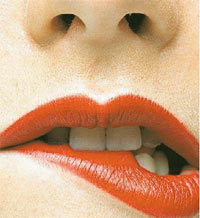
Desire: a term utilized by French psychoanalytic theorist Jacques Lacan to explain the development of the individual as a social and symbolic being. Although the notion of 'desire' can be and often is thought of as having to do primarily with relations between the sexes, Lacan traces the function of this fundamental concept to the very beginnings of an individual's identity formation as a result of the subject's extrance into the symbolic world of language. Lacan explains the development of an individual's identity in a child as movement from an 'imaginary' realm of seamless union with its surroundings to a 'symbolic' realm characterized by a sense of separation and thus the necessity to articulate needs. Prior to her entrance into language, the child does not perceive herself to be separate from her world or the things which meet her needs; there is only a continuous presence. When the child begins to realize her independent existence from the mother (a realization brought on in part through the insertion of the father into the mother-child dyad), there opens up for the child a gap or discontinuity, a lack where there has been wholeness . . . Without that seamless wholeness in which all needs were met, there will always be something missing. Because the child is now a symbolized subject, inscribed in the realm of language, and because there is by virtue of the representational nature of language an incommensurability between the signifier (the word) and the signified (the thing represented), there will always be for symbolic subjects this gap between what we need and what we demand. The difference between need and demand, which can neither be named nor satisfied, is desire.Because at its core desire is a longing for that imaginary prelinguistic wholeness and unity, we are destined to be continually desiring.
Anna Geronimo, 'Desire', in Elizabeth Kowaleski-Wallace (ed.), Encyclopedia of Feminist Literary Theory, (New York & London: Garland, 1997), p. 111.
The child must now resign itself to the fact that it can never have any direct access to reality, in particular to the now prohibited body of the mother. It has been banished from this 'full', imaginary possession into the 'empty' world of language. Language is 'empty' because it is just an endless process of difference and absence: instead of being able to possess anything in its fullness, the child will now simply move from one signifier to another, along a linguistic chain which is potentially infinite . . . This potentially endless movement from one signifier to another is what Lacan means by desire.
Then the Lord God said, 'See, the man has become like one of us, knowing good and evil' . . . He drove out the man; and at the east of the garden of Eden he placed the cherubim, and a sword flaming and turning to guard the way to the tree of life (Gen.3:22,24).


0 Comments:
Post a Comment
<< Home